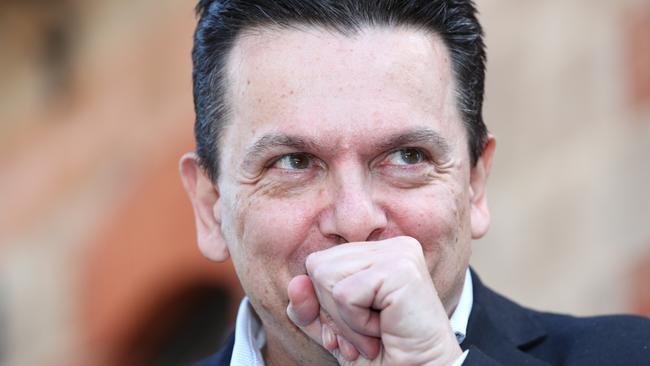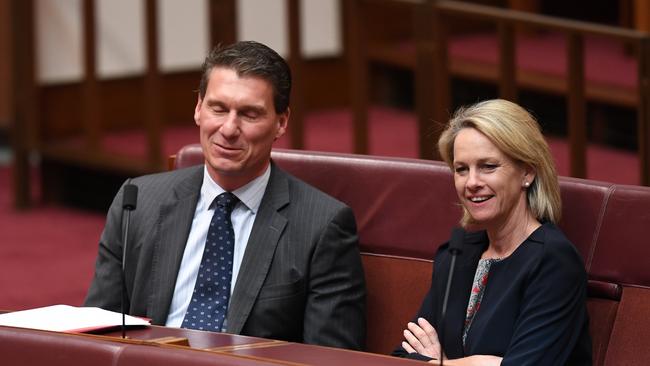Our multicultural society can’t afford leaders with dual loyalties
EVEN if the dangers seem far-fetched, our politicians definitely should not be allowed to hold citizenship rights in other countries, writes Parnell McGuinness.

Rendezview
Don't miss out on the headlines from Rendezview. Followed categories will be added to My News.
ONE after another, our politicians are discovering that they hold citizenship rights in other countries.
Last week I discovered that my five-year-old son is a New Zealand citizen, bringing him to a potential citizenship count of three. With many Australian bitzers having bitzers of their own, the situation in parliament is devolving into a multicultural farce.
On one level, it’s great slapstick.
Nick Xenophon MP Rebekha Sharkie threatened to cut off supply to the government, but the ploy backfired when her leader Nick Xenophon turned out to be a hereditary Pom.
One Parliament-based journo overheard a Liberal staffer gloating that none the Libs had been caught up in the citizenship crisis yet. Staffers beware: the motto of this unfolding crisis seems to be “pride goeth before a fall”.
For his part, Bill Shorten is playing the politics of this to the last card. He’s refused to reveal if there are concerns over any of his team.
In the short term, that ratchets up the pressure on the government, as the high court deliberates on the future of Barnaby Joyce, Fiona Nash and Matt Canavan.
But it’s a huge gamble: the PM offered him a bit-part in the government’s crisis. Having knocked it back, he might end up with a starring role on his own.
Cory Bernardi saw an opportunity in all of this to grab a bit of profile for himself. He channelled the Australian people in his call to just make it stop. Suspend parliament until the High Court can sort it all out, he said.
I reckon ordinary voters, watching this farce unfold, are close to adding that pretty much the entire lot of federal parliamentarians should be grounded and sent to their room without a travel allowance as well.

The debacle has raised an important question in our multicultural society.
Namely, since so many Australians are dual nationals, should parliamentarians be allowed to retain multiple citizenships?
After all, none of the seven pollies who’ve discovered bonus citizenships are under suspicion of lacking genuine allegiance to, and affection for, Australia.
What a luxury to be able to think like that. It’s true, Australia is an enormously successful multicultural society. But that doesn’t mean we can take it for granted.
A protest in Sydney last week is a good reminder of why a constitutional provision to prevent individuals with potentially divided loyalties from serving in federal Parliament.
On Indian Independence Day last week, a convoy of supercars drove through Sydney decorated with the Chinese flag and revved their engines outside the Indian consulate.
They were making a point in a border dispute between China and India which most Australians know nothing about. As demonstrations go, it was acceptable: there was no violence or even abuse involved.
But it fills me with unease.
Australia is a peaceful country. People from around the world come here to live together as Australians. The rule has always been that ethnic tensions from the old country should be left at the door.
Imagine if that dispute were to play out in our parliament, between Chinese-Australian and Indian-Australian dual nationals. Would their second nationalities influence how they interact? Politicians can’t be allowed to keep their options open because we need to know for sure they’ve always got Australia’s best interests at heart.

If we’re worried about the influence of foreign donations — and we should be — then we’ve also got to worry about how citizenship can divide allegiances.
This is more than just theory. It’s happening in Europe now.
Turkey recently held a constitutional referendum to give its president authoritarian powers.
In the lead-up to the vote, Turkish President Recep Tayyip Erdogan made it plain that he regards Turkish dual nationals throughout the world as his subjects.
He campaigned on European soil. He told European-Turks that their home countries were “racist, fascist and tyrannical”, and when Germany tried to clamp down on rallies, Erdogan and his foreign minister, Mevlut Cavusoglu, accused Germany of “fascist actions” that “resemble the Nazi era”.
More menacingly, Erdogan also warned that European citizens would not be able to walk their streets safely if they kept up their current attitude towards the Turks and Turkey.
And in the end, the majority of European-Turkish dual nationals living in Europe voted to expand Erdogan’s powers in Turkey.
Now the German election is coming up in September.
Again Erdogan has addressed German-Turks directly — particularly the 63 per cent of German-Turks who voted to expand his powers. He has called Germany’s politicians “enemies of Turkey” and told them not to vote for any of the major parties in the upcoming German federal elections.
There are two minor parties in Germany which are presumably acceptable to Erdogan. Both parties are aligned with Erdogan’s “Justice and Development” party.
Ultimately, an authoritarian foreign government could be in a position to directly influence political deliberations, including foreign policy, to suit its agenda.
Sure, in Australia we can joke about the terrors of New Zealand pulling the strings from across the ditch. And from the pub it looks like this bunch could be extended the benefit of the doubt and allowed to fix things retrospectively.
But even if the dangers seem far-fetched, there remain plenty of good reasons why our constitution should not be changed, as has been suggested, to allow people entering federal parliament to intentionally keep a foot in another camp.
Section 44 was conceived before multiculturalism, but in our multicultural society, it is more important than ever.
Parnell McGuinness is Managing Director of Thought Broker.


